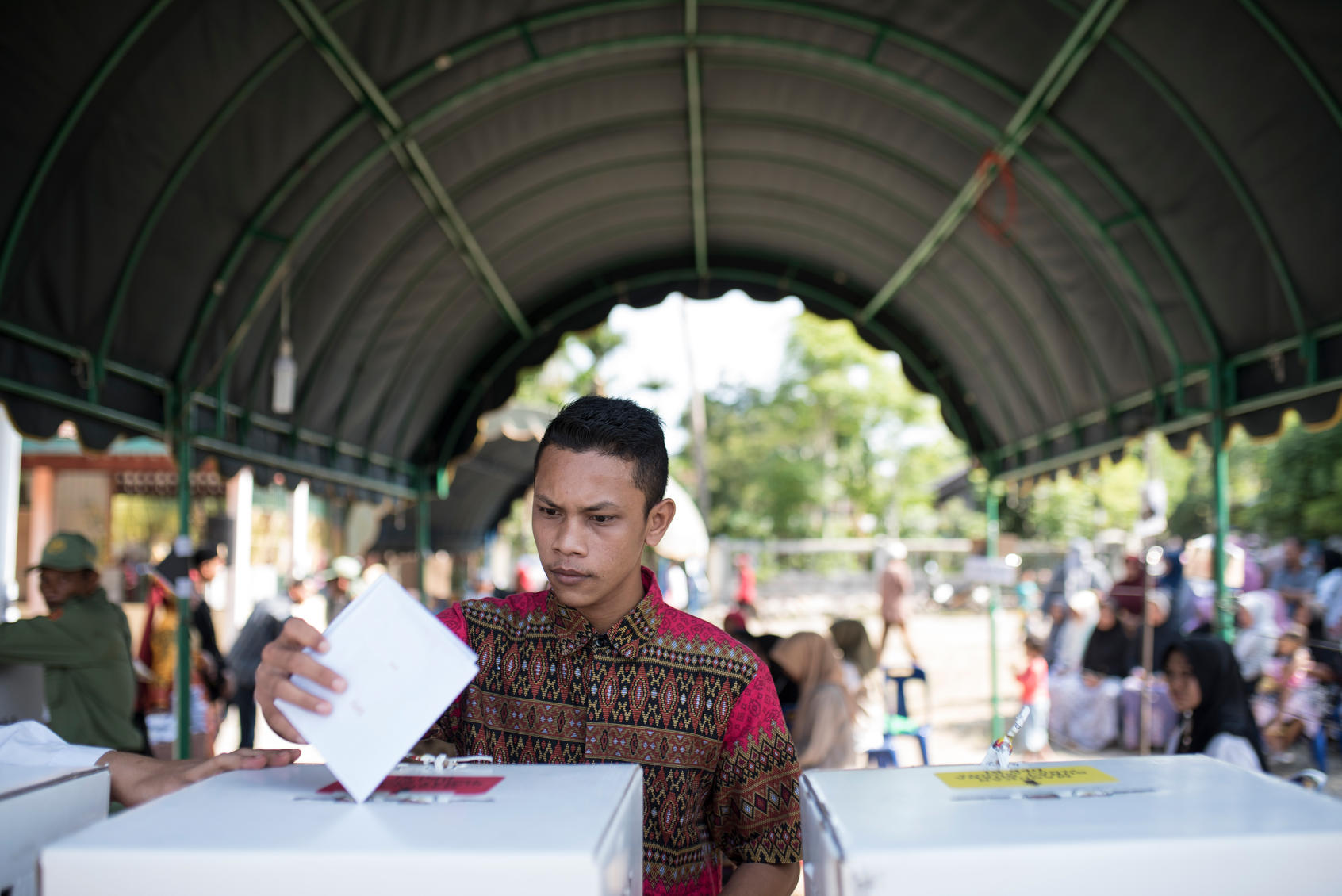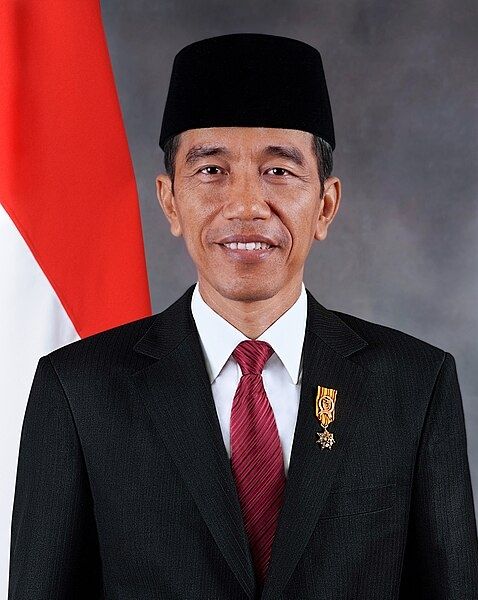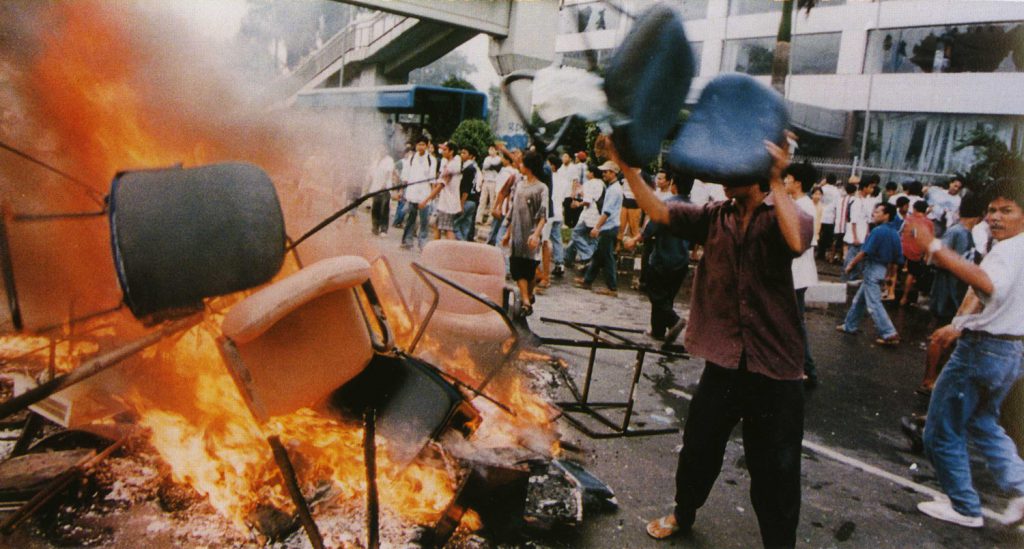recent
Indonesia's Unlikely Democracy Remains Resilient
Despite the brief unrest that followed the announcement of Jokowi’s victory, the election of April 17 stands as a testament to the continuing resilience of Indonesia’s young democracy.

Indonesians refer to election day as Pesta Demokrasi—which translates to “Democracy Festival.” And it’s easy to see why. On April 17, about 156-million eligible Indonesians cast their votes forpresident at 809,500 polling stations strewn across 17,000 islands. Coinciding with the world’s largest direct presidential election were parliamentary and local legislative elections, with more than 20,000 seats contested by more than 245,000 candidates. Overseeing the entire process were around 6-million election workers—a force larger than the entire population of neighboring Singapore. As CNN reported, “ensuring this mega-poll in the world’s third largest democracy would go off without a hitch was a logistical feat, with election workers traveling by boat to remote islands, scaling mountains to reach hill-top villages and trekking through jungles—sometimes on horses—to bring ballot boxes within range of every voter.”
All in all, April’s election was billed as “the most complicated single-day elections in global history.” It was also deadly—though not in the way you might expect. An estimated 139 election workers and police officers reportedly died from exhaustion due to the sheer scale of the enterprise, while more than 500 fell ill.

On the presidential ballot, incumbent Joko Widodo faced off against long-time rival Prabowo Subianto. As predicted, Widodo emerged victorious, carrying 55% of the vote. After the official count was released by the country’s elections commission on May 21, two days of rioting gripped Central and West Jakarta, with clashes between Prabowo supporters and police yielding six deaths, 700 injuries and more than 200 arrests. Among those arrested included Islamic State affiliates and six individuals planning on assassinating public officials. Less dramatically, Prabowo’s campaign subsequently lodged a protest at the Constitutional Court, citing irregularities in the polling. (A ruling is expected by June 28.) But in a country that’s become quite familiar with mob violence, it was perhaps unsurprising that many Jakartans seemed to react to the unrest with apparent nonchalance.
An unlikely democracy
Indonesian democracy has come a long way since the downfall of the “New Order” dictatorship implemented by General Suharto between 1966 and 1998. Its flourishing has been all the more remarkable given that Indonesia previously had little to no experience with democratic traditions. Individual rights and democratic institutions generally weren’t found in the Hindu and Muslim kingdoms of the pre-colonial era, nor under the 350 years of Dutch colonial presence that followed.
Following independence in 1949, Indonesia experienced a brief democratic experiment under its founding father, Sukarno, before he installed an authoritarian corporatist model called Guided Democracy. Sukarno was overthrown by Suharto, who implemented a firmer military-backed system. His brutal regime would last until the 1997 Asian Financial Crisis, which saw the country’s GDP shrink by 14% and the rupiah lose 30% of its value. Rampant inflation led to student protests and widespread riots. The May, 1998 riots in Jakarta alone killed an estimated 1,200 people.

Sensing where the winds were blowing, the Jakarta elites abandoned Suharto, forcing him to step down. With him fell the whole rotten edifice of the New Order. Over the last 20 years of democratic consolidation and liberalization, restrictions on the press were removed, freedoms were granted to political parties, civil society was bolstered, the military was sent back to its barracks, and greater autonomy was provided to the outer islands. Indonesia held free and fair elections in 1999, 2004, 2009, 2014 and again this year.
Indonesia’s last elections in 2014 saw Joko Widodo (nicknamed Jokowi) face off against Prabowo Subianto, an ex-general and son-in-law of Suharto. While Prabowo’s campaign channeled muscular strongman politics, hardline Islamism and nostalgia for the New Order, Jokowi campaigned on economic reform and clean governance. Journalist Michael Vatikiotis reporting in 2014, wrote of the enthusiasm Jokowi’s campaign elicited in ordinary voters: “we saw the first signs that Indonesians were doing more than just voting this time—they were actively participating in political campaigns.” (Emphasis added).
Jokowi won 53% to 47%. But over the last five years, unfortunately, he has demonstrated some of the same illiberal tendencies that he campaigned against in 2014. And despite the success of this year’s elections, the country still faces problems that, in the long run, could upend its two-decade democratic experiment.
Corruption and politics of patronage
Corruption remains endemic in Indonesia. Between 2014 and 2018, approximately two dozen MPs in the House of Representatives were indicted or convicted on corruption charges. Many prosecutors and judges also have been implicated. Even the Constitutional Court has been rocked by corruption scandals, with a former chief justice being sent to jail in 2017 for accepting bribes. In a 2018 poll, only 50% of respondents expressed confidence in the House of Representatives, as compared to 73% in regard to the Indonesian Armed Forces.
Indonesia took a big step in combating corruption in 2002 with the establishment of the Corruption Eradication Commission (the KPK, as its known), which racked up many high-profile successes in its early years. However, the KPK’s efforts stalled in 2009 when it launched investigations into Indonesia’s notoriously corrupt police forces. One senior police officer famously likened the investigation efforts to geckos trying to fight a crocodile. Over time, Jokowi was accused of using anti-corruption campaigns as a weapon to undermine his political adversaries. And by early 2016, Jokowi was forced to effectively dismantle the KPK as a trade-off for pushing through his economic reforms.
Meanwhile, KPK officials continued to face threats of reprisals. The most notorious incident involved an acid attack on prominent investigator Novel Baswedan in April, 2017, which left him blind in one eye (police have yet to catch his attackers). More worrying has been claims that the Jokowi administration has instrumentalized the fight against corruption to investigate and arrest opposition party members and those tied to opposition-affiliated campaigns, as well as coerce regional party members affiliated with the opposition to support Jokowi’s campaign.
Creeping authoritarianism
Creeping restrictions on public discourse have been observed during the Jokowi’s rule, most notably under the Information and Transaction Law of 2008 (later amended in 2016), which allows the state and private individuals to prosecute anyone who makes “false and slanderous” statements online. A string of prosecutions was launched on the grounds of combating online hate speech. In an interview for NHK, Chairman of the Alliance of Independent Journalists Abdul Manan described the law as one of two regulations that “threaten journalists and could easily send them to jail.”
Another controversial measure was the Civil Society Organizations Law of 2014, which allows the state to disband any civil-society organization accused of violating Pancasila (Indonesia’s state philosophy—a mash-up of social justice, belief in a single God, and democracy), endangering law and order, or undermining the constitution. The regulation was used in 2017 to ban Hizbut Tahrir Indonesia, an Islamist organization that calls for the abolition of secular rule in Indonesia—a move later criticized by Human Rights Watch.
In the run-up to the April election, Jokowi increasingly used the state apparatus to clamp down on expressions of dissent, such as the #2019GantiPresiden (#2019ChangePresidents or 2019GP) movement, which started off as a viral Twitter hashtag. There were reports of police confiscating 2019GP merchandise from shopkeepers and intimidating citizens who displayed the hashtag. Meanwhile, 2019GP events in Serang, Bandung, Surabaya, Pontianak, Palembang, Aceh and other parts of Indonesia were prohibited outright. As noted by PHD candidate Tom Power, the crackdown on 2019GP presented the “first time since the fall of Suharto that a government has used the state security apparatus for the open, large-scale repression of a democratic opposition movement.”
A militarized democracy?
The fall of Suharto in 1998 triggered the gradual retreat of the Indonesian Armed Forces from civilian politics. This included an official disavowal of the concept of dwifungsi (“dual function”), which had legitimized the military’s participation in both security functions and civilian life during the New Order. The military had maintained a ubiquitous presence in Indonesian public life during the Suharto years, with serving military men holding positions in all levels of government, including as city mayors, ambassadors, jurists and even Cabinet ministers.
Shortly after Suharto’s resignation, reforms were instituted that gradually removed military officers from most civilian duties, while the police were separated from the military chain of command. Military-run businesses that has been used to finance the army’s budget were consolidated under the Defense Ministry in order to improve corporate governance. Despite this, the military still maintains pockets of influence in Indonesian political life, including through local development projects such as food distribution and road building programs in remote regions. As well, the 2004 TNI Law allows serving officers to hold jobs in certain civilian institutions, with recent outcries over proposals to amend the law to broaden the scope of ministerial and other civilian institutions officers would be allowed to take jobs in.
As Evan A. Laksmana of the Centre for Strategic and International Studies points out, however, the military’s involvement in Indonesian political institutions has remained minimal since democratization. Military retirees have won fewer than 4% of all local elections since 2015. And in the 2014 elections, retirees constituted less than 3% of the total number of elected candidates.
Nevertheless, Jokowi evidently views the support of this constituency as indispensable, and has appointed prominent military retirees hailing from the New Order era to cabinet positions, the most notable example being Wiranto, the former head of the Indonesian Armed Forces from 1998 to 1999. Wiranto now holds the position of Coordinating Minister for Political, Legal and Security Affairs—a position from which he previously had been barred after being indicted for war crimes committed in East Timor.
Still worryingly, prior to the outbreak of the May riots in Jakarta a retired special forces chief, Major General Soenarko, was arrested and charged with subversion after allegedly trying to smuggle weapons to the anti-Widodo protesters. Referring to the incident, a recent Asia Times piece noted that Prabowo (himself a veteran) retains much support from anti-Widodo retirees who served under Suharto; many of whom also retain a voice in the present TNI.
Islam and the Threats to Pluralism
One of the biggest issues during the recent election campaign was the status of Islam. Indonesia is famously described as a “moderate” Muslim country, due to the unique brand of Islam practiced in the archipelago: a syncretization of Islamic traditions with the region’s pre-Islamic Hindu, Buddhist and animist practices. Unlike my own country of Malaysia (which purposely ignores much of its pre-Islamic history), Indonesians still take pride in their ancient pre-Islamic roots.
Muslims constitute 88% of Indonesia’s population, with the remaining 12% composed of Christians, Buddhists and Hindus. The relative tolerance that historically characterized interactions between these groups now risks being undermined by the rise of a more puritanical form of Islam imported from the Middle East.

It is difficult to comprehend how the more hardline, joyless Islamic sects (the Wahhabi school of Sunni Islam practiced by the Saudis, most notably) could have been successfully imported into a country proud of its country’s multicultural character, and where women command high levels of societal respect. But it has been happening, and Islamism now presents a real long-term threat to Indonesian democracy.
The modern Islamisation of Indonesia can be traced to the Sukarno years following independence. A ministry of religious affairs was one of the first institutions set up by the new republic. Islamic education was introduced into public schooling, Islamic universities and institutes were established, and subsidies were provided for pilgrimages and religious studies overseas. Programs were created to promote Arab-style dress and architecture. The government even sponsored conversion efforts among the indigenous animists of Indonesia, and supported campaigns to encourage the migration of Muslims into non-Muslim areas such as Kalimantan, Ambon, Papua and East Timor.
This state-directed Islamisation of society intensified under the Suharto era. Although seemingly secular in its initial stages, the Suharto regime eventually sought to curry favor from so-called “greens” in order to counteract the influence of the military. There was encouragement to increase Muslim content on state-owned television and radio networks. Public lotteries were banned, and Islamic dress codes encouraged for women. There was a wave of state-funded construction of mosques and prayer houses, altering the landscape of both rural and urban Indonesia to render it more visibly Islamic.
Besides providing a mechanism for state control, these pro-Islam policies paradoxically also provided a medium for anti-statist opposition. Many prominent Islamic groups operating in Indonesia today had their roots on university campuses, where they used mosques as a safe space for students to vent their frustrations about the state of society and test the limits of political defiance.
This Islamic revivalism took place during a time of rapid economic development in Indonesia, with mass urbanization and social dislocation causing many Indonesians to use their faith as a refuge from uncertainty and a marker of identity. In his recent book Blood and Silk, Vatikiotis recalls a conversation with Islamic intellectual Jalalludin Rakhmat, who told him: “When you have no control over the environment and feel powerless, so people defer to supernatural forces and the assumption of spiritual power over the environment.”
The collapse of the New Order and subsequent political liberalization provided new spaces for Islamist politics to spread. More women now wear the headscarf than back in the Suharto era. New regulations restrict the building of non-Muslim houses of worship. In 2017, parliament debated a ban on alcohol (though it was eventually struck down), while discussions were had in 2018 about banning gay and pre-marital sex. Religious hardliners have even pushed for child marriage and condemned vaccinations.
The creeping influence of hardline Islam into Indonesian politics was really brought home during Jakarta’s gubernatorial election in 2016, when Islamic groups were able to prevent the re-election of then-incumbent and Jokowi ally Basuki Tjahaja Purnama (commonly called Ahok). Their main complaint was that Ahok had committed blasphemy against Islam by improperly quoting a Koranic verse. (The fact that Ahok is a member of the Chinese Christian community—which historically has been viewed with suspicion—probably contributed to the outrage.) A coalition of Muslim groups organized rallies against Ahok, the largest of which was held in Jakarta and attracted 2-million attendees. Not only was Ahok defeated at the polls, but he was found guilty of blasphemy in court and sentenced to two years in prison (he was released in January of this year).
Jokowi, clearly rattled by the anger at Ahok, attended an anti-Ahok rally and prayer meeting personally. He also made the surprise move of appointing senior cleric and veteran politician Ma’ruf Amin as his running mate. The move was calculated to shore up Jokowi’s support base among conservative Muslims, with Jokowi himself candidly admitting, “I am a nationalist. He is a devout religious figure. We complement each other well.”
Ma’ruf has strong religious credentials in the eyes of many Muslims, being chairman of the powerful Indonesia Ulema Council (Indonesia’s national clerical body). But he has shown streaks of intolerance, as well. His organization issued the fatwa that labelled Ahok a blasphemer in the first place. He has sought to place restrictions on houses of worship for non-Muslims, and has spoken out against the LGBT community and the minority Ahmadi sect.
This clearly wasn’t enough for many hardline Muslims it seemed, as many decided to throw their lot in with Prabowo. As Jokowi feared, the Prabowo campaign exploited the ‘Islamic card’ as a line of attack against him, with most charges against him claiming he was anti-Islam and anti-ulema (Islamic clerics).
Ultimately, this election saw conservative Islam used as a prop on both sides. And many secularists gave up hope before the votes were even cast. “No matter who ends up being president,”observed Indonesian novelist Eka Kurniawan glumly back in February. “Conservative Islamic groups, backed by radical groups, will win—have already won—the election.”
However, as Indonesian researcher Nick Kuipers argued in an interesting pre-election study, this presents an incomplete picture. After exhaustively going through the campaign platforms of 72,486 candidates at all levels of government, Kuipers found that, on average, only 5.7% of candidates referred to religious themes in their platforms. (Interestingly, candidates running for national parliamentary office were more likely to employ religious rhetoric as compared to those running for local office.)
Jokowi’s victory may also provide some glimmer of hope. Academic Yohanes Sulaiman, in a post-election analysis, argued that Jokowi’s victory demonstrated that Islamists could still be beaten at the ballots provided moderates continued to come out in force to defend their cherished pluralism.
Indonesia at a crossroads
Despite the brief unrest that followed the announcement of Jokowi’s victory, the election of April 17 stands as a testament to the continuing resilience of Indonesia’s young democracy. But for Indonesian democrats, the job remains unfinished, and fears of backsliding abound. Jokowi’s authoritarian tendencies and his failure to address rampant corruption remain subjects of concern. Meanwhile, Indonesia’s military and the country’s Islamists could take advantage of any available crisis to seize more influence.
In an era where it is fashionable to bemoan the retreat of democracy, Indonesia’s seem to be advancing forward. But it still has a long way to go before a reversion to autocracy becomes unthinkable.






